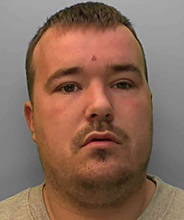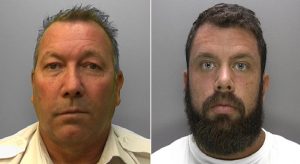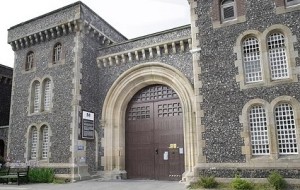A Brighton “wheeler dealer” and two corrupt prison officers were among 10 people sentenced today for conspiring to smuggle drugs and phones into Lewes Prison.
Daniel Sallis, 31, an unemployed scaffolder, of Bexhill Road, Woodingdean, was jailed for five years. He was a prison inmate at Lewes when he became involved in the smuggling plot.

Sallis used a bank account in his name for receiving and transferring money related to the buying and selling of drugs and other banned items.
Two prison officers Ricky Bridger, 55, of The Oaks, Heathfield, and Simon Taylor, 29, of West Way, Wick, Littlehampton, were jailed for ten and eight years respectively.
They were caught thanks to a sniffer dog called Dougie, Hove Crown Court was told today (Friday 28 July).
Andrew Frymann, prosecuting, said: “An unsung hero in this case, cocker spaniel search dog Dougie, indicated to his handler in the prison gym orderlies’ office that there were prohibited drugs in two Pringles tubes.”
The tubes, concealed in a girder, contained steroid liquid, four syringes, ten needles, a mobile phone SIM card and more than 100g of a psychoactive form of synthetic cannabis called spice.
Mr Frymann said that the pair smuggled in steroids, cocaine and spice as well as mobile phones and accessories for £1,000 per consignment.
The drugs and phones sold for about four times their value inside the prison, the court was told.
But it was an irony, Judge Paul Tain said, that the maximum sentence would have been greater if Bridger and Taylor had sold drugs on the street rather than smuggled them into Lewes Prison.
The judge said: “Providing class A drugs to anybody is repellent because the courts are full every day with the consequences of drug abuse.”
Those consequences included theft and violence, he said, adding: “Pretty well anything that goes into prison has a ‘four times’ value compared to its value on the outside so there are huge and significant profits to be made.”
He said that the prison housed people with mental health problems and others who were extremely vulnerable, including addicts.
And thanks to the phones, including those with wifi, prisoners running gangs could carry on dealing drugs from inside prison – and threatening violence and intimidating people.

He said that Bridger, who was suspended from his job, and Taylor, who was no longer a prison officer, that this was a “grave breach of your obligations of your job”.
The judge told the pair: “Your obligations were – to put it crudely – to warehouse people who are in the prison system and to do so fairly properly and reasonably and to take part in the rehabilitation process.
“It remains an absolute obligation on all prison officers … to provide protection for people in society from people in prison but to protect people in prison from others and any harm they might do themselves.”
It was difficult to envisage any more serious breach of your obligations, he said, as he highlighted Bridger’s “cockiness” just before he was “caught red-handed” and even during his trial.
“Could there have been a worse case? The conclusion I reached is that there couldn’t have been.”
He told Taylor: “You didn’t really care what was in the packages.
“Like Mr Bridger you are a very greedy person with no moral compass whatsoever and you must pay the price for that.”

Sallis’s barrister Richard Hutchings said in mitigation: “It was said in the trial that he was something of a wheeler dealer. He was not one of the ringleaders.
“He took advantage of a situation. He was prepared to get his hands dirty. He was someone for whom the temptation was too great.
“He has had trouble throughout his life staying on the straight and narrow.
“The majority of his convictions have been of a relatively minor nature – and certainly nothing for drugs.”
He had an unedifying number of previous convictions including several for matters of dishonesty.
And, Mr Hutchings said, he has been something of a gambler but was taking steps as a father now to clean up his act.
His partner Sheryl Donegan was charged with being part of the prison smuggling plot but cleared by a jury during the eight-week trial at Hove.
Mr Frymann described serving prison inmates Simon Khalil, 34, and Dorian Henry, 26, as the ringleaders.
They admitted their part in the plot and were were each jailed for three years, as was Simon Penton, 45, who was not present because of ill health and who had pleaded not guilty.
Another inmate, Darren Burdfield, 33, was jailed for five years.
Burdfield’s mother and girlfriend helped handle the profits from the trade in drugs and phones inside the prison.
Sabrina Burdfield, 61, a care assistant, of Redwing Close, Wick, Littlehampton, was given a 12-month prison sentence suspended for 18 months and a four-month curfew.
Darren Burdfield’s heavily pregnant partner Sarah Hall, 32, a care assistant, of Barnet Way, Durrington, was also given a 12-month prison sentence suspended for 18 months and a four-month curfew.
Khalil’s ex-girlfriend Katie Rudd, 26, unemployed, of Park Farm Lane, Maresfield, was given a two-year prison sentence suspended for two years and a six-month curfew.
The jury failed to reach a verdict on whether Dorian Henry’s sister, Danielle Henry, 34, a finance clerk, of Aldred Road, London, was part of the plot. She was ordered to face a retrial and will return to court in September.

Detective Chief Inspector Till Sanderson, from the Surrey and Sussex Major Crime Team, led the investigation with officers from the Sussex Police Serious Organised Crime Unit and said: “This investigation, carried out in partnership with Lewes Prison and HM Prison Service focused on intelligence about attempts to undermine the effective working of the criminal justice and rehabilitation system.
“This case is a result of a Sussex Police investigation into a conspiracy to convey prohibited articles into HMP Lewes, including controlled drugs, steroids and new psychoactive substances similar to spice, mobile phones, mobile phone accessories and alcohol over a 15-month period.
“The initial success of the operation by prisoners owed a large part to the corruption of two prison officers.
“Financial inquiries revealed a large number of suspicious financial transactions that could be linked to serving prisoners, close family members and friends and prison officers.
“This was supported by paperwork that was seized and the identification of phone numbers during cell searches within the prison, backed up by telecommunication analysis.
“Sussex Police will be seeking to confiscate criminal assets gained by this group under the Proceeds of Crime Act.
“It is believed the group’s criminal benefit from this conspiracy was in excess of £170,000.
“We will always follow up any information about such activities and anyone with information can contact us online or by calling 101 and arranging to talk in confidence to experienced investigators.”









